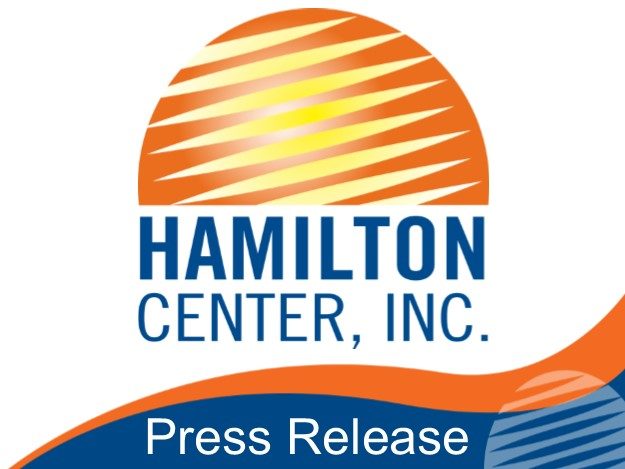Hamilton Center, Inc. is proud to lead the way as one of eight demonstration pilot sites included in the State of Indiana’s newly acquired Certified Community Behavioral Health Clinic (CCBHC) Medicaid Demonstration Program.
In the six months since HCI was announced as a CCBHC demonstration site, staff members have been working hard to hire additional staff and develop program guidelines for existing service areas as well as a new Mobile Crisis Unit in Sullivan County and a Crisis Response Stabilization Services office at the corporate building in Terre Haute.
Effective January 1, 2025, the whole way that HCI is delivering behavioral health in supporting its communities is changing, according to Art Fuller, Chief of CCBHC at Hamilton Center, Inc.
“CCBHC is here, and it’s here to save lives,” Fuller said enthusiastically. “We recently received what I call the ‘Golden Certificate’, and that certificate indicates that we now have a full crisis continuum at Hamilton Center. We can now provide better and faster service – especially when we’re dealing with mobile crisis runs and really trying to support those that are in crisis.”
Announced on June 4, 2024, The U.S. Department of Health and Human Services (HHS), through the Centers for Medicare & Medicaid Services (CMS) in partnership with the Substance Abuse and Mental Health Services Administration (SAMHSA) welcomed Indiana among 10 new states into the Certified Community Behavioral Health Clinic (CCBHC) Medicaid Demonstration Program, after they successfully developed the necessary state-level infrastructure and worked with providers in their states to develop programs that meet CCBHC standards.
The CCBHC Medicaid Demonstration Program provides states with sustainable funding that helps them expand access to mental health and substance use services.
“Hamilton Center has worked for several years to position itself to deliver enhanced services to our communities”, said Melvin L. Burks, Hamilton Center’s President and CEO. “We would like to express our gratitude to the State of Indiana for its leadership and all of our community partners who work with us to deliver high quality healthcare.”
CCBHCs must ensure access to a comprehensive range of services, providing care coordination when needed and incorporating evidence-based practices and other supports based on a community needs assessment.
As a CCBHC, Hamilton Center, Inc. will serve our communities by:
• Responding through Mobile Crisis to behavioral health and addiction emergencies in the community
• Enhancing 24/7/365 crisis stabilization services throughout West Central Indiana
• Integrating with the National Suicide Prevention Lifeline (988)
• Coordinating primary healthcare needs
Additionally, this newly-acquired designation allows Hamilton Center to further serve the community through continued reduction of non-emergent Emergency Department visits, diverting individuals from incarceration to treatment, increasing access to Medication Assisted Treatment (MAT), and investing in the healthcare workforce.
Category: Hamilton Center, Inc. News
This category contains content related to Hamilton Center, Inc. News.
CCBHC is here! New designation
HCI mobile crisis services expand to Sullivan
As part of its expansion into becoming a Certified Community Behavioral Health Clinic, Hamilton Center, Inc. has expanded its mobile crisis services to Sullivan County.
HCI has operated a mobile crisis unit from its main office in Terre Haute for the past four years.
Lesli Bose, HCI’s director of crisis diversion, said the Sullivan office was chosen for the expansion due to the county’s high suicide completion rate.
The mobile crisis unit currently operates from 8 a.m. to 5 p.m., but Bose said once the facility is fully staffed it will run 24 hours a day, seven days per week.
Incoming calls will serve a 45-mile area surrounding Sullivan.
Bose noted the Sullivan office has a mini-van dedicated to these runs, and lack of transportation to the HCI office is one primary reason for the need of the service.
“Some people don’t have transportation, especially a lot of individuals that are in rural areas,” she said. “It’s quite a long way for some of them to get to an office when we’re talking about the area that we’re serving. The unit allows our team to go to wherever they are. Sometimes they’re out in the public at grocery stores or at a park, but a lot of times they’re at home.”
Bose noted the primary goal of the team is to de-escalate that crisis on scene and provide support and intervention resources.
“We hope to be able to resolve that crisis in the community,” Bose said. “If not, then they can provide assessment on-site or bring them back to an office if there’s not an appropriate location for them to be assessed in the community.“
Depending on the location, bringing the individual back to an office may happen if there is nowhere private to assess the person.
“Otherwise, they will provide that assessment in the field, and then they can determine along with the prescriber the appropriate level of care and then get them to a higher level of care if that’s what’s recommended,” she said.
Increased awareness of the program will allow it to grow as time passes, and Bose thinks it has been successful so far.
“We have been able to help some of the community partners there in the schools,” she noted. “We’ve had some other runs within the Sullivan community. It is slowly developing, but they’ve been successful in being able to get people served that aren’t able to come into offices.”
Bose said that 10 more staff members are needed to reach the around the clock goal for the mobile crisis unit. Anyone interested is encouraged to visit hamiltoncenter.org/employment to learn more about the positions and fill out an application.
Bose emphasized the importance of peer recovery specialists (staff members who are successfully in recovery) in the process of helping consumers.
“Peer recovery specialists are really effective since they’re able to provide lived experience themselves with mental health and or substance use,” she said. “They’ve been very helpful in engaging consumers, building rapport with them, increasing their motivation for change or to engage in treatment. The peers have been very, very beneficial to our team.”
Rose Shepler, health educator for the Sullivan County Health Department, is thrilled with the expansion of the mobile crisis unit and thinks it will be highly beneficial for the Sullivan County community.
“I think it’s a great idea and very much needed,” she said. “Sullivan County would benefit from resources that help to decrease successful suicide rates. Indiana’s average is actually higher than the national average, and Sullivan County specifically is higher than Indiana’s average.”
Shepler noted that Sullivan County has also taken steps itself to help with the problem, opting in for the Health First Indiana initiative. This legislation was passed in 2023 and prioritizes core services in a fatality review of children, suicide, and overdose.
“In thinking about the unit, a lot of times our law enforcement officers are responding to a mental health crisis situation and they may lack the resources to support someone in crisis,” she said. “Hamilton Center’s mobile crisis will be a valuable asset to provide that needed care and support for people in crisis.”
Award nomination shows Pritchard making big impact in short time with HCI
Adrienne Pritchard has not worked very long for Hamilton Center, Inc., but in her five months with the corporation she has made an impression on someone.
Pritchard was anonymously nominated as a 2024 Hero for Recovery in the “Recovery Coach of the Year” category. Pritchard attended the Mental Health America of Indiana awards luncheon in Indianapolis on Dec. 13.
She was not chosen as the winner of the award, but admits to being “amazed” at even being nominated considering the length of time in her position as a peer recovery specialist.
“I was amazed because I’ve had my Certified Peer Recovery Coach [CPRC] license less than six months,” Pritchard said. “It was amazing that I touched somebody enough that they felt the need to nominate me. It could have been anyone — any employee or any consumer.”
Pritchard admits that she is in the process of rebuilding her life after incarceration and drug abuse sent her on a downward path.
She served five years in the Indiana Department of Corrections at the Indiana Women’s Prison after being convicted of burglary related to funding a drug habit which had escalated after the death of a family member.
Pritchard had gotten in trouble for having marijuana in college, when she attended Lincoln College in Illinois on a basketball scholarship. She had previously attended Lincoln Trail College after a celebrated career at Terre Haute North.
While in high school, Pritchard was an honorable mention all-state selection her junior and senior years and was chosen to play in the North-South Indiana All-Star game after her senior year.
She went on to Lincoln, a private, Division II school, and was dismissed from the team after her drug use was discovered.
“I came home, and my dad passed away,” she recalled. “He was my best friend, so that’s when I started doing hard drugs. I had never done hard drugs until my dad died, and that was a very quick downhill spiral for me.”
Not surprisingly, Pritchard admits she was very upset about going to prison once she was convicted.
“Vermilion County threw the book at me,” she said. “I signed a 10-year plea, an open plea with a 10-year cap, and they gave me nine years total with six years executed [served] and three years of house arrest.”
In the end, though, Pritchard is positive that prison saved her life.
“If they would’ve put me back out on house arrest right then and there, I would be dead today,” she said. “It’s a different perspective that I have now looking back. I went to prison in 2019, but I didn’t get clean until 2022. I got released from prison in 2023.”
Pritchard did not adapt to the prison’s drug treatment well, and was actually removed from the program twice before taking advantage of a final chance.
“Any treatment program that you go through, you’re going to get out what you put into it,” she said. “I couldn’t stay out of trouble, and was kicked out of the program twice. I was always moving in and out of being in segregation.”
Pritchard recalls that the director of the program told her that her third chance would be her last one.
“She said I was either going to complete this program or you’re not, but she was not allowing me back in again,” Pritchard said. “I completed the program, and then I was asked to stay on the unit as a mentor. I taught classes and mentored other women.”
Her success in mentoring other inmates helped her to join the Hamilton Center staff after her release.
From her experiences with HCI, she has learned that major life events like the death of a parent can sometimes trigger heavy drug use — but it’s not a 100 percent occurrence.
“It’s different for everybody, but I think it’s present in a lot of cases,”she said. “ It’s usually something very traumatic or past traumas from childhood that isn’t dealt with. Mental health issues and substance abuse run hand in hand, and very rarely do you find one without the other.”
Pritchard’s status was changed from house arrest to probation, and when she’s finished with that part of the program she’ll be completely done with that part of her life.
One of the requirements for being hired as a peer recovery specialist with HCI is a successful experience with recovery, as those who know how the cycle works are best suited to help others facing similar struggles.
“I have a different perspective for consumers, especially ones that struggle with addiction because I know exactly how it feels to be where they are,” she said. “That’s why peers are so beneficial, because we do have a different understanding. We can level with the consumer on a different page than someone who’s never struggled with that problem can.”
HCI consumers appreciate having someone to talk to who has been where they are.
“They are a lot more willing to open up,” Pritchard said.
Pritchard said that whether or not a person is successful with recovery has to do with the mental aspect of being in it for the proper reason.
“You can’t want to get sober for somebody else, or you can’t get sober because the courts said you have to,” she said. “You won’t ever make it. You have to do it for you and you have to want it because it’s an everyday battle.”
Pritchard has set up some consumers two or three times in treatment facilities, and for a while they will be doing well.
“Unfortunately, relapses are a part of sobriety,” she said. “Relapses happen, and it’s what you do with that relapse.”
Pritchard, 28, could not have predicted how her life would turn out as a teenager.
She finished three years of coursework in pre-med with a minor in psychology with hopes of being a pediatric doctor.
Hamilton Center is venturing into a new era of being a Certified Community Behavioral Health Center, a designation which includes increasing its amount of mobile crisis runs to help people in their communities.
Those trips require a peer recovery specialist to be present with other staff members, and Pritchard loves her job.
“Peers don’t do their jobs for the money,” she said. “They do it because that’s what they’re passionate about. This job gives me a purpose. Not only do I get the substance use side of it, I get the mental health side, and that’s two things that I’m very passionate about.”
She has worked both day shifts and evening shifts, and recently switched to overnights.
Pritchard recently read that the importance of having a peer recovery specialist present on a visit is vital, and that there is an 86% success rate with a peer on scene.
“That’s tremendous,” she said. “Now we’re getting to a point where the Vigo County law enforcement officers will call us, and we’re building that relationship with them. It’s really come a long way.”
Pritchard plans to return to school and will major in psychology as she works to become a therapist.
“I’d love to work with little kiddos,” she said.
Pritchard is exploring the opportunities HCI provides to get tuition assistance in her quest to become a therapist.
“It’s amazing that Hamilton Center helps people achieve better things, and how there’s always room to grow,” she said. “I also appreciate whoever nominated me for that award. That means a lot to me because if I can help one person every day, that makes that day great.”
HCI benefits from city, United Way ARPA grant
The United Way of the Wabash Valley and the City of Terre Haute are pleased to announce the allocation of $750,000 through their Nonprofit Grant Program, funded by the American Rescue Plan Act (ARPA) as approved by the City Council.
This initiative will support 20 local nonprofits dedicated to serving the community.
Hamilton Center received $38,255 for new chairs to improve sanitation for staff and clients.
Mayor Brandon Sakbun expressed enthusiasm for the program, stating, “The United Way and City of Terre Haute Grant Program provides vital funding opportunities for small businesses and nonprofits.
These grants, made possible by the American Rescue Plan Act, will foster support to our nonprofit community and offer essential support to Hoosiers impacted by the pandemic and rising inflation. Programs like this embody the true spirit of local government, creating opportunities that benefit all.”
The Nonprofit Grant Program aims to alleviate operational pressures for nonprofits, enhancing their organizational capacity and development to better serve the city’s most vulnerable populations. These grants are designed to promote efficiency and effectiveness, allowing organizations to fulfill their missions more sustainability. Eligible nonprofits applied for funding to support various initiatives, including organizational planning, staff development, capital expenditures, and infrastructure improvements.
Grant amounts range from $10,000 to $50,000.
Hamilton Awards highlight of annual gala
Hamilton Center Inc. hosted its annual Hamilton Awards dinner on October 22 at the Sycamore Banquet Center on the campus of Indiana State University. Over 300 staff, community partners, and referring organizations enjoyed dinner and celebration of Hamilton Award nominees. The theme for the event, “Everyone, Everywhere” suggests several ideas, all rooted in the immense responsibility Hamilton Center has to deliver the highest quality of healthcare services to a very diverse and widespread population in central and west central Indiana. Very few things in life affect us all.
“Everyone, Everywhere” deserves health services that are accessible, timely, cost effective and of the highest quality. Hamilton Center strives to provide integrated healthcare that is person centered and meets people where they are,” stated Margie Anshutz, Chief Development Officer.
Hamilton Awards were also presented. Named in her honor, Katherine Hamilton fought for the inclusion, acceptance, and support of those struggling with mental illness in the early 1960s. She emphasized the importance of community in her life’s work. In this spirit, Hamilton Center awards were created to recognize individuals and organizations who have significantly contributed to the cause of mental health and addiction while furthering the mission of Hamilton Center, Inc. in the community.
All nominees were recognized, and winners were:
Volunteer winner, Rebecca Johnson: Rebecca is all about “paying it forward”. She has used her past life experiences to assist others struggling with addiction and working towards recovery. She was a past participant in the Parke County Drug Court. Since her graduation from the program, she has been dedicated to assisting others on their recovery journey. She leads the Celebrate Recovery meetings in Parke County two night a week and serves as a mentor and support to many. She sponsors several people going through the program showing up at court with enthusiasm, support and compassion.
Community winner, John Plasse, (given posthumously): A former Vigo County Sheriff, Plasse spent over 33 years in Vigo County law enforcement as a Police Chief and later as Sheriff. He also spent equally as long serving our country, retiring as a sergeant major with the 38th Infantry Division in the Indiana Army National Guard. Sheriff Plasse was a true community servant, devoting his time to numerous organizations including the Board of Directors at Hamilton Center. In the words of his nominator, John Plasse was a great leader, worked with integrity and was always focused on the goal of bettering others and protecting the public.
Youth winner, Bring Change to Mind (North Vigo High School): This organization empowers students to advocate for mental health awareness to help create a more empathetic and stigma free school environment. Bring Change to Mind is an evidenced based student led club available to all students. Terre Haute North’s club encourages youth to take a proactive approach to mental health and self-care while equipping club members as emerging peer advocates with the tools and skills to create real change in their communities. Representing the Club were Amanda Higgins, Valeri Kershaw, and several Club officers.
Staff winner, William Kennedy (Peer Recovery Specialist): Kennedy has only been at Hamilton Center since June of this year but has already made a tremendous impact on so many lives. He is always the first person to offer help, no matter the situation taking his job very serious and understanding the importance of the work. He finds positive light in some of the darkest situations and treats all consumers with dignity, respect and compassion. He works tirelessly to facilitate services and find placement for those struggling with addiction issues and uses his own past experiences to connect on a deeper level with the consumers he serves.
Frank W. Jerse award, Dennis Weber: This award is presented annually to a community member who is a veteran or advanced the educational system in central and west central Indiana. Dr. Jerse, for whom this award is named, served his country during World War II and received a purple heart. Upon returning from war, he received a doctorate in psychology and dedicated a significant portion of his career furthering post-secondary education at Indiana State University. He also played a vital role in the development of Hamilton Center Inc. Weber is a retired mathematics teacher and football coach. Weber is a resident of Clinton, IN and a graduate of Indiana State University. He spent close to 40 years teaching mathematics at the high school level and coached football at North Vermillion, South Vermillion, and Terre Haute South Vigo. He is a role model to students and athletes; Many students looked up to him and he always wanted students to achieve both on the field and off.
Burks to be honored as Indiana State University Distinguished Alumnus
Congratulations to Hamilton Center, Inc., President/CEO Melvin L. Burks for being selected as one of three Distinguished Alumni by Indiana State University. He will be honored at the school’s homecoming football game on October 26.
Click here to read more:
Long-time mental health advocate John Plasse succumbs to cancer
Hamilton Center is deeply saddened by the recent passing of Sheriff John Plasse. Through his years of public service, he advocated to strengthen support for those struggling with mental illness and addiction through various initiatives and programs within the local government, judicial system, and law enforcement. In recent years he was a member of the Hamilton Center Board of Directors and has also served as Board President. His commitment to our community and to ensuring excellence in mental health care has and will continue to impact and save lives.
“I am grieving the loss of Sheriff Plasse with our entire community”, said Melvin L. Burks, Hamilton Center’s President and CEO. “He is a true hero and servant for so many things including his decorated military service and the services he gave to this community.” he stated. “I love him and will deeply miss him as a friend and community servant.”
Hamilton Center announces new childcare program
Hamilton Center is excited to announce our newest program serving children birth through two years of age. The Hamilton Center Childcare Program is a licensed program located in Terre Haute that accepts self-pay and payment through the Child Care Development Fund (CCDF) and is open to both staff and consumers in addition to community members. You can learn more about the program here or by contacting Tiffany Cherry at tcherry@hamiltoncenter.org or 812-231-8156.
Hamilton Center’s Childcare Program provides family-centered services for very young children and their families. The program is designed to promote the development of the children. It promotes the physical, cognitive, social, and emotional development of infants and toddlers through safe and developmentally appropriate caregiving. The program prepares children for continued growth and development and eventual success in school and life. Staff and providers can connect children and their families to the broad array of clinical or community-based services provided by other Hamilton Center programs through referrals.
Parke County drug court provides many benefits to consumers
By CHELSEA WELLS, Director of Communications
The Parke County Drug Court was implemented in June 2006 as an alternative to traditional case processing of drug offenders. The drug court targets non-violent, felony drug offender. It is a voluntary program in which eligible offenders participate in an intense, multi-phase treatment program, submit to frequent drug testing, attend 12 step meetings, complete substance abuse treatment programing, remain alcohol and drug free, and complete other drug court responsibilities while under the supervision of the drug court team. Drug court is designed to give drug users the treatment and other resources they need to end their dependency. Successful participants will have their charges dismissed.
Hamilton Center became a member of the drug court team in its inception. Hamilton Center completes an assessment, makes treatment recommendations, and offers clinical guidance for substance use treatment throughout the drug court process.
Since January 1st, 2023, Parke County Drug Court has conducted 1,326 drug screens. Out of these 1,326 screens, only 21 of them were confirmed positive. Further, since January of 2023, we have had 12 graduations and only 3 terminations.
Here are some testimonials from our recent graduations:
“Drug Court is a tough but fair program. I am glad that my county offers a program like this as it allowed me to continue growing my own business. Not only did the program and staff allow me to keep working, but they also help me get in control of my addiction. I am thankful for Drug Court.”
“Hamilton Center was easily my strongest support while in Drug Court. I would not be where I am without my Peer Recovery Coach from Hamilton Center. She has showed me the better way to live.”
“Drug Court was patient with me while I struggled to find employment because of my pending charges, and for that I am grateful. I did not realize how much happier my life could be without being dependent on drugs.”
“Today I know who I am. Most importantly I know what I do from day to day and remember it. I can honestly say that I have put my life back together one step at a time. It was tough but I got there and it’s great, I am great, my life is great.”
Hamilton Awards Announced – “The Ripple Effect”, the theme for the 2023 event
Hamilton Center Inc. hosted its annual Hamilton Awards dinner on Tuesday, October 24, at 6:00 pm at Sycamore Banquet Center on the campus of Indiana State University, Terre Haute IN. Over 350 staff, community partners, and referring organizations enjoyed dinner and celebration of Hamilton Award nominees. Featured, was keynote speaker, Art Fuller, Chief of Hamilton Center’s Certified Behavioral Health Clinic (CCBHC) initiative.
Joining Hamilton Center in March 2020, Fuller has a passion for spreading optimism and was selected as a Hamilton Award Winner in 2021. Art has 25 years of experience in education serving culturally diverse students, students with disabilities, and families who are English language learners. He spent 7 years as a legislative liaison in support of pre-K through higher education and has 10 years of experience as a nonprofit executive and school leader. Art earned a BA in Neuroscience and Behavior from Wesleyan University (CT) and a Master of Education in Middle School Mathematics from Lesley University (MA). He is completing a dual degree Master of Public Health / Doctor of Health Sciences at the University of Indianapolis (IN) focused on health equity.
The theme for Tuesday’s event, “The Ripple Effect” suggests that one person’s actions can impact so many others. Clinical staffs’ work with one consumer at Hamilton Center often ripples to the family, the consumer’s friends and ultimately positively impacts the entire community. Consumers are able to live independently with improved relationships and become productive members of the community.
Hamilton Awards were also presented. Named in her honor, Katherine Hamilton fought for the inclusion, acceptance, and support of those struggling with mental illness in the early 1960’s. She emphasized the importance of community in her life’s work. In this spirit, Hamilton Center awards were created to recognize individuals and organizations who have significantly contributed to the cause of mental health and addiction while furthering the mission of Hamilton Center, Inc. in the community. All nominees were recognized, and winners included:
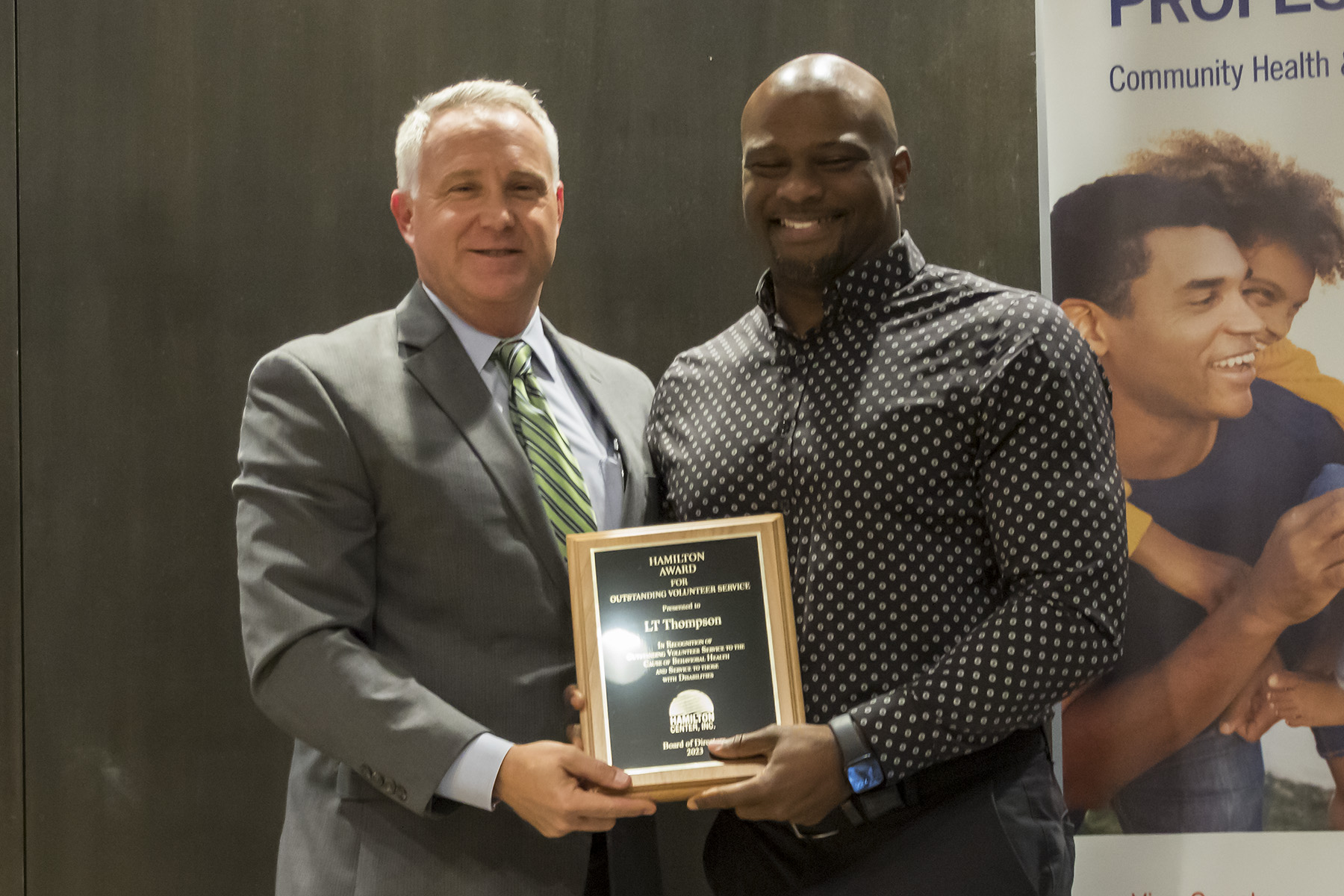
Volunteer winner: LT Thompson, an individual who has not only devoted his life to assisting people to improve their health through wellness but has mentored so many children who would otherwise not have the means to participate in organized sports or other community events. Thompson has spent hours coaching and training kids in sports and in life. He often transports them to games and practices and pays their participation fees out of his own pocket to get them involved. He is a wonderful role model to many and his mentorship has provided guidance and support to children who needed a positive role model in their lives.
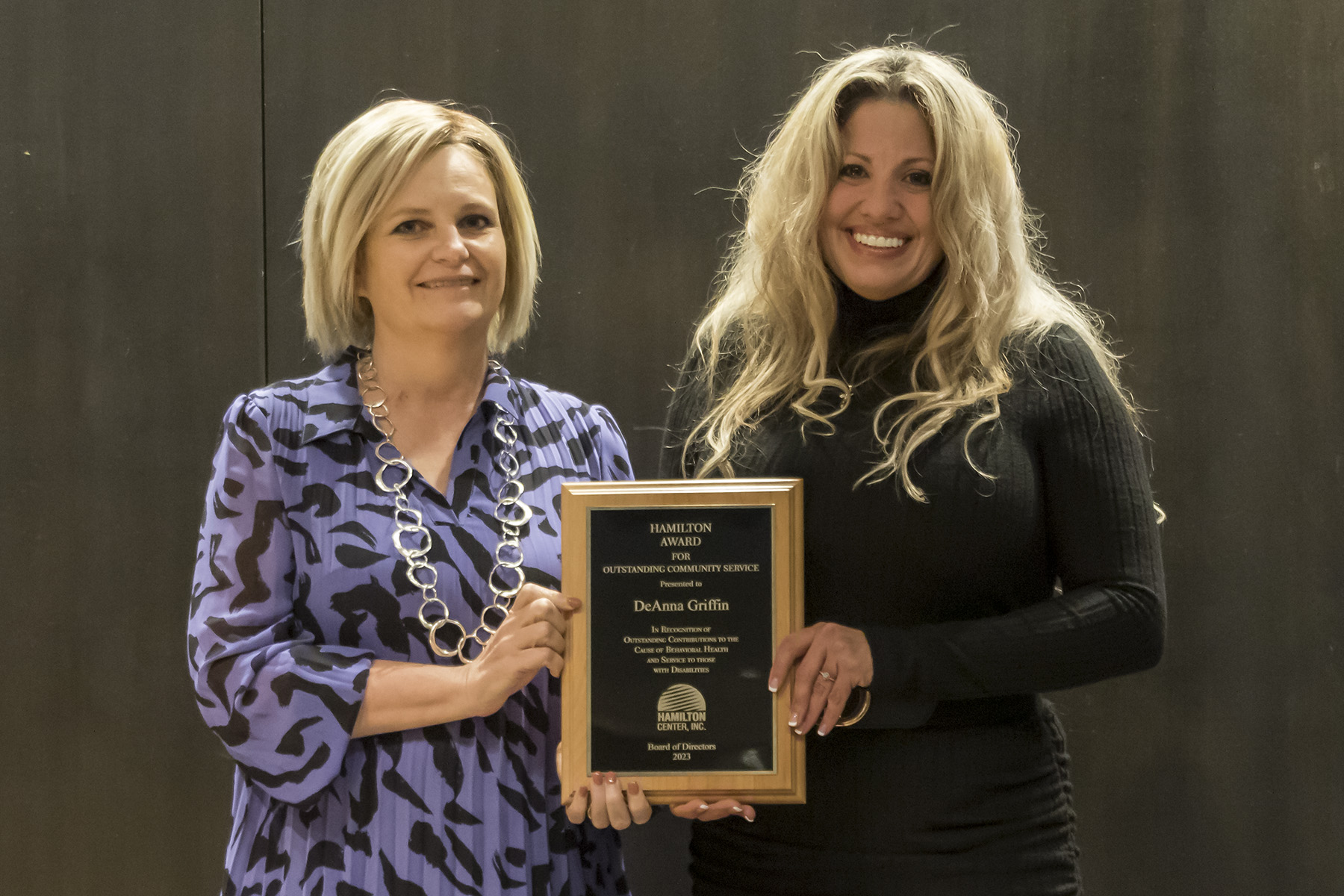
Community winner: DeAnna Griffin, Executive Dir. of Phoenix House. Griffin was described as an incredible advocate for woman in recovery. She works tirelessly to reunite women in recovery with their children – providing love and support throughout the entire process. Griffin works with the only recovery house for women in Terre Haute – Phoenix House. It is a faith-based residential recovery program that provides a structured sober-living environment, along with 12 step recovery, behavior modification, accountability, peer support, service work, support groups, and discipleship teachings of biblical truths. Griffin is building sisterhood, impacting community and reigniting hope in so many.
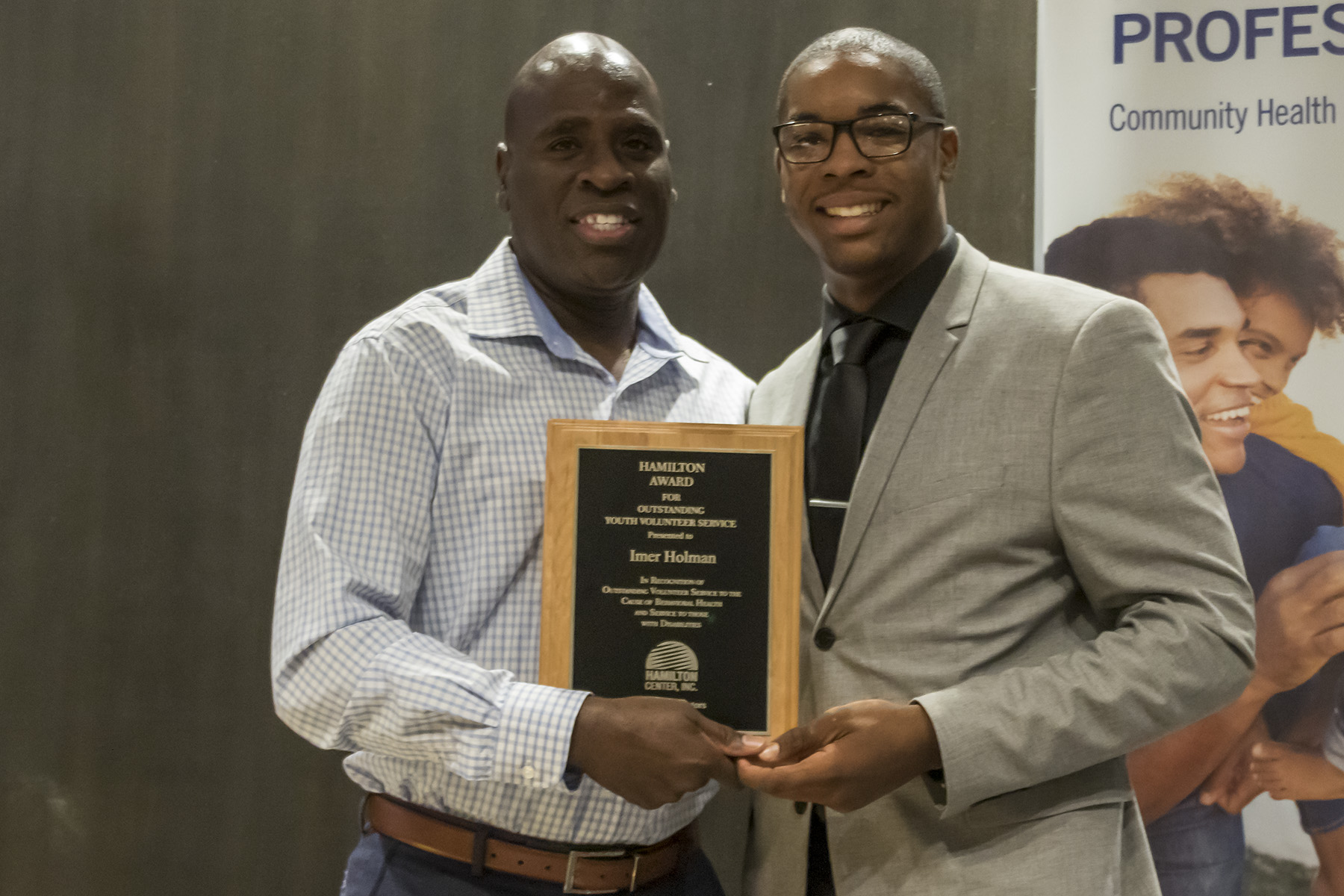
Youth winner: Imer Holman, a student who was described by his nominator as a young person who embodies the attributes of a truly great person. He is unselfish and works to improve the lives of others. He started a program at Terre Haute South to help students understand that there is always someone available to help if in need. Holman teamed up with Hamilton Center to initiate events at middle schools and in the community to provide assistance to students struggling.
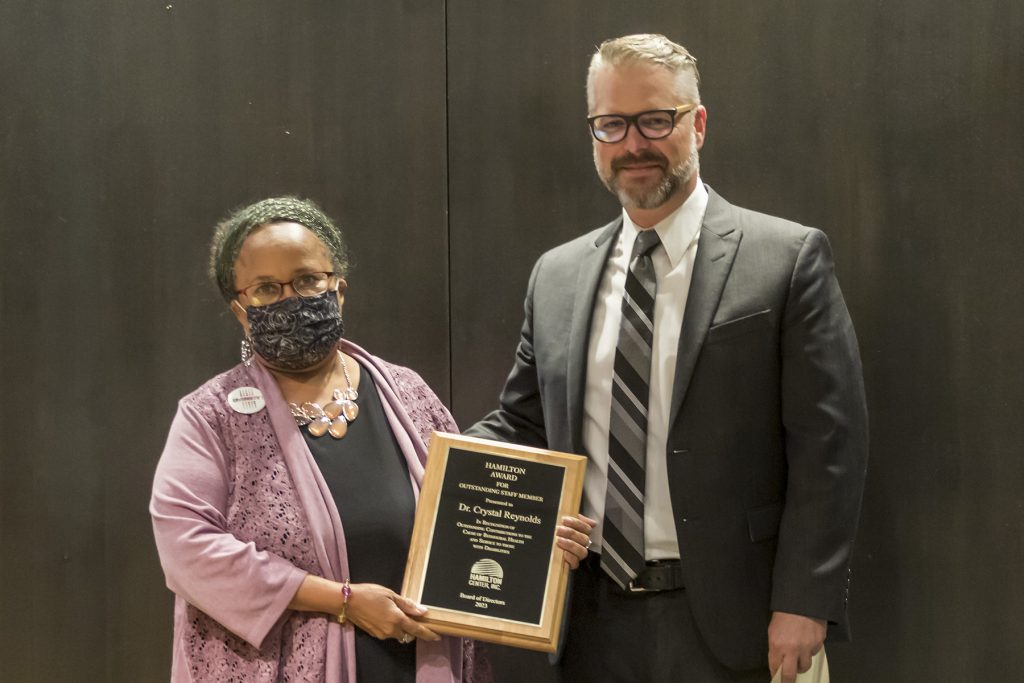
Staff winner: Crystal Reynolds, PhD, a women described by her nominator as the most compassionate person that he has ever known. Reynolds background and experience in education, legal, and consulting has uniquely positioned her to holistically assist consumers in various facets of their lives. Her dedication, willingness to serve, and commitment to the community is unmatched. She has been working for Hamilton Center since 2019 as a Care Manager. Her educational and work experience are extensive which includes a Doctor of Philosophy from Indiana State University, a Doctorate of Juris from Tulane University and bachelors and master’s in history from Indiana State. Reynolds is known for her outspoken advocacy, compassion, and community service.
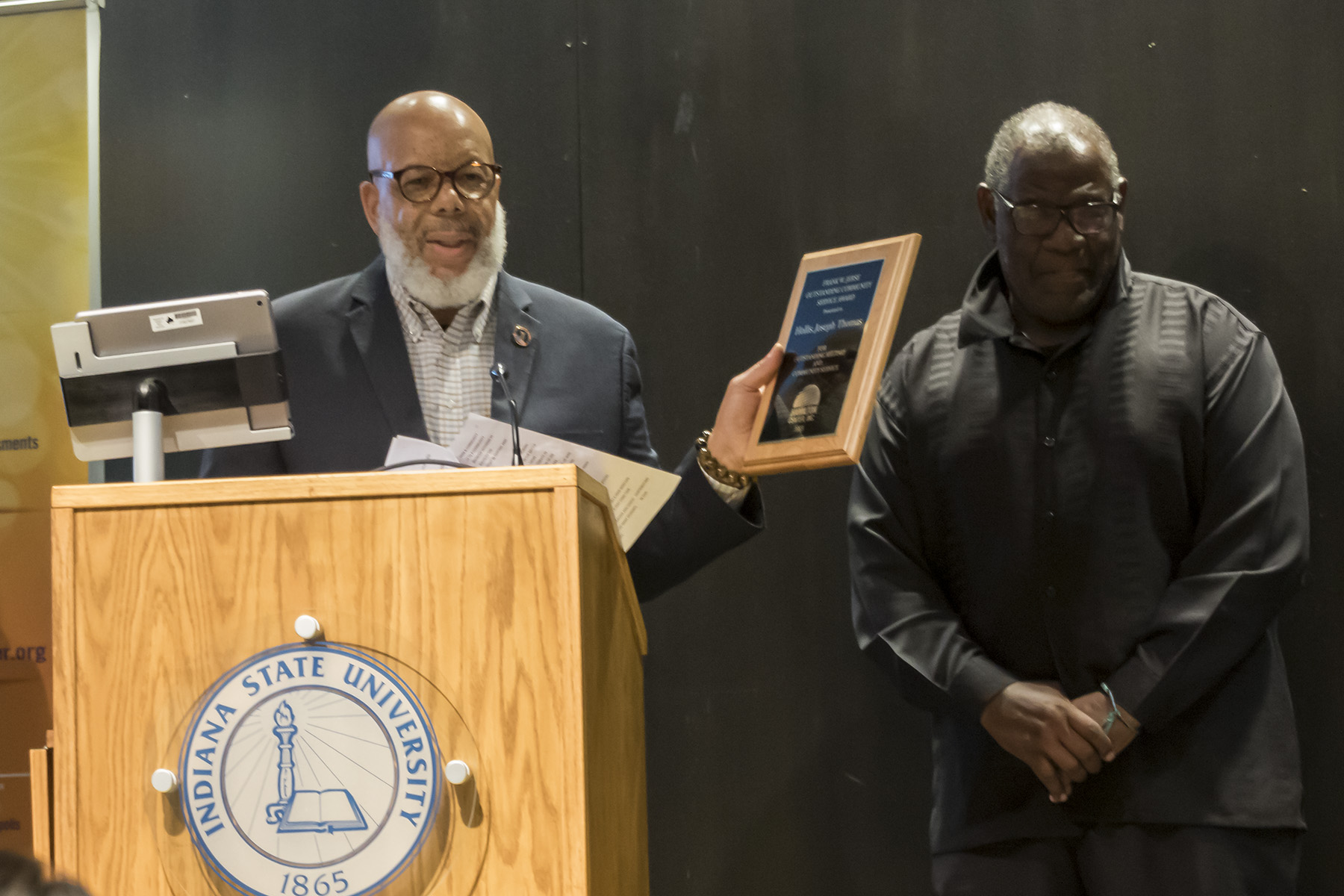
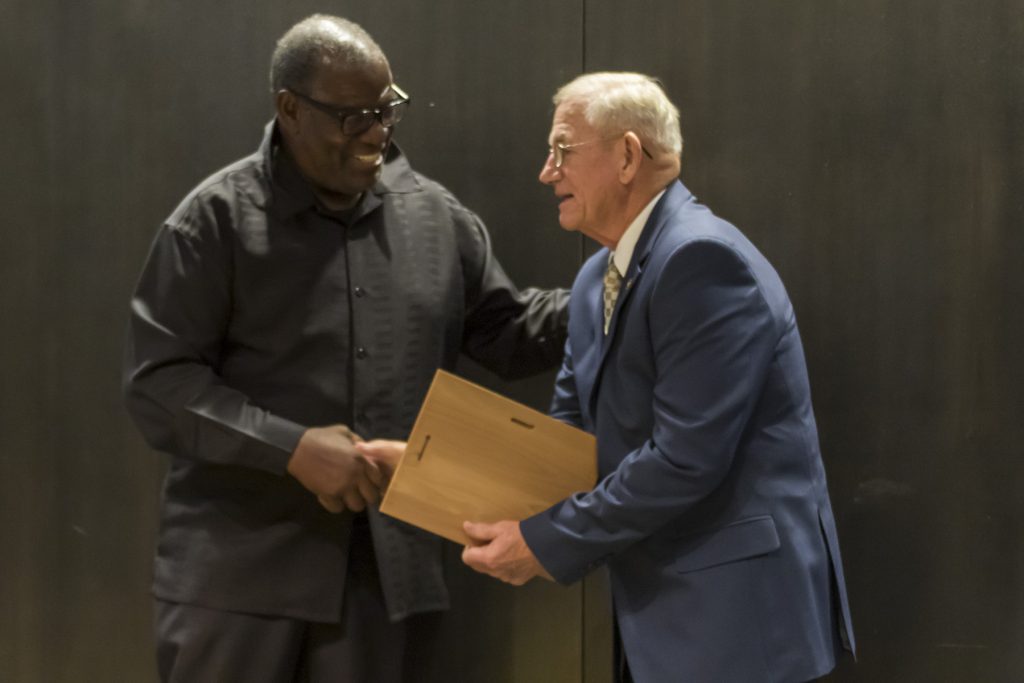
Lastly, the Frank W. Jerse awards are presented to annual to community members who are veterans, assisted veteran families or advanced educational system in central and west central Indiana. Dr. Jerse, for whom this award is named, served his country during World Warr II and received a purple heart. Upon returning from war he received a doctorate in psychology and dedicated a significant portion of his career furthering post-secondary education at Indiana State University. He also played a vital role in the development of Hamilton Center Inc. Winners of the 2023 Frank W. Jerse award were Daniel McGrath, valued coach and educator, and Hollis Joseph Thomas, veteran.

